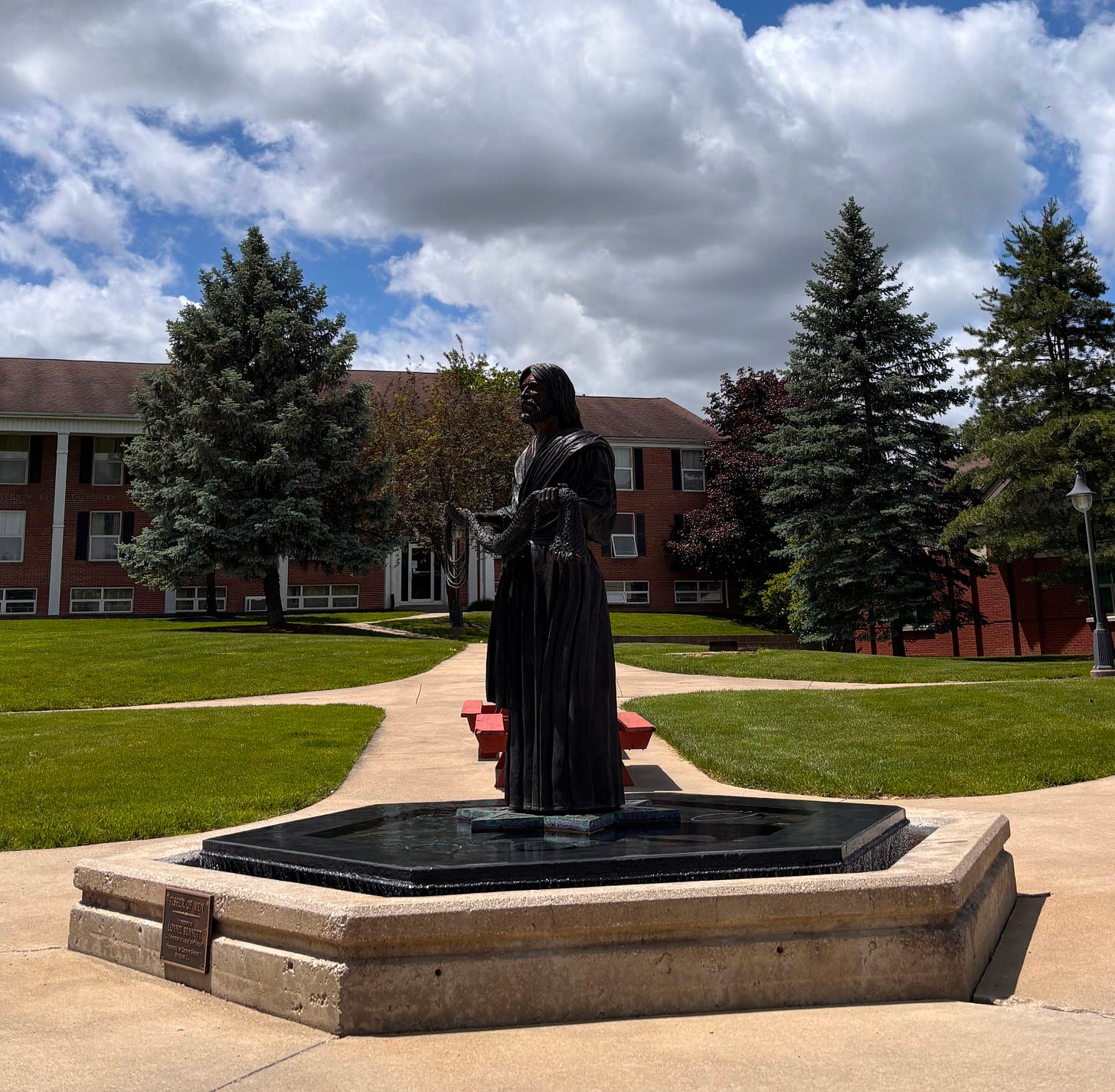I took a break last week from writing to prepare for the Resilient Leader Retreat, a 2-day event I’ve coordinated the last two years for the North Central region of the Brethren Church. The foundational goal for this retreat is the spiritual formation of leaders. It is about deliberately positioning ourselves as followers of Christ at the feet of Jesus to be shaped and formed by him, recognizing that we have to keep doing this, all of our lives.
Of course, this isn’t a task that can be accomplished in one 24-hour period, but the hope is that we might swing wide the gates of our own palaces in time and bask in God’s presence for the weekend, leaving renewed and inspired, with a greater sense of who we are and whose we are.
This year’s event was centered around three core longings—the deep need for security, acceptance, and significance—that reside in each of our souls. I pulled these ideas from Bruce Terpstra’s book, Three Passions of the Soul, but you can find them bundled by different terminology in a lot of different teachings, including Henri Nouwen’s book In the Name of Jesus: Reflections on Christian Leadership.
The three core longings we talked about are:
Acceptance: The longing to be loved, valued, and accepted by others.
Security: The desire for safety, stability, and certainty in life.
Significance: The need to make a meaningful impact, to be valued for one's contributions.
Our core longings often trace their roots back to childhood experiences. When these needs are unmet, they can create lasting emotional longings that influence us throughout our lives. For example, if a child grows up without the security of a stable home or reliable routines, they may grow into adulthood with a heightened need for stability or safety. If a child feels rejected or unnoticed, they may develop a strong desire for acceptance or belonging.
Over time, we internalize these gaps and develop a longing for what was missing. We carry these longings into adulthood, trying to satisfy them through external means, whether it be relationships, career achievements, or material security.
We all have these experiences. They shape and form us into the adults we are today.
It’s important to recognize that while these longings are valid and deeply part of who we are, God alone has the power to heal these childhood deficits. We spend a lot of time, energy, and resources trying to satisfy core longings that only God can fully meet. Only He can truly fulfill the deep desires in our hearts that were formed in our early years. Nothing else fully satisfies.
As we grow in awareness of our core longings, we can invite God to meet us in these places, healing past wounds and fulfilling our deepest needs in ways that no external source can.
I’ve been thinking a lot about these core longings this week, not just because of the retreat, but because I’ve been revising a chapter in my next book, which is about my relationship with my dad. When I look closely at that relationship, I can see some of the reasons why I often long for significance, how I often seek out ways to satisfy a desire to matter. For much of my teen and adult life, I’ve looked for ways to measure if I’m enough. Have I done enough yet? Have I earned approval?
Sometimes memoirists are accused of navel-gazing, but I prefer to think of my writing as soul searching. When I write, I am on a treasure hunt in this personal palace in time, to see what gems I can find that might unlock more about who I am and how I was made. Because through this search, I am able to better know my Maker.
When done well, the writer can access the universal human experience through their individual, particular story. By seeking to know myself and by sharing about that self in my writing, my hope is to help a reader arrive at that moment when they say, “You too? I thought I was the only one.”
And that connection itself, through time and space and language, is a universal experience that is particular to our species: precious, holy, and sacred.
Anyway, core longings.
I’ve also been thinking about core longings this week because I regularly find myself chewing on the motivation for taking or not taking various jobs or responsibilities. I’d like to go with my gut, but my gut has sometimes been wrong, and I’m still navigating a sea of bad theology about following God’s particular and narrow and trickster will, and what is my motivation here, really, and is it rooted in my need for significance, and even if it is, does that mean it’s a bad thing?!
It’s a privilege and curse to have the space and time to over-analyze like this.
Gratefully, the mystic-of-the-month in my Mini-Mystic Book Club is Francois Fenelon, whose book, The Seeking Heart had this tidbit for me recently:
When you are completely given to God, all that you do is profitable, even if you don’t do much. Offer your future up to God, and don’t try to figure out what will happen to you. It shows your faithlessness when you want to know the future that God has chosen to conceal from all of us.
Thanks, Frank, for that bit of wisdom and good reminder to just let it be. Just be. God has already approved of what you do.
We ended the first night of the retreat with forgiveness and core longings in our minds, and I think I’ll leave you with those questions here too.
Which of the three passions or longings—acceptance, significance, or security—resonates most with you?
Can you identify a childhood experience where this longing may have started or was intensified?
Was there a deficit or shortage in your early life that contributed to this longing?
How might you invite God into this longing to bring healing or fulfillment? If you feel any bitterness or resentment toward someone from your childhood, how might you work toward forgiving that person?
My friend and seminary professor Jayne Wilcox offered the retreat participants a structure for working toward the decision to forgive someone, which often precedes the Holy Spirit’s work to emotionally forgive. Forgiveness is difficult and unnatural work for many of us. I know it has not come easy to me, so I was delighted to learn a similar structure to the one Jayne gave the group. It comes from The Book of Forgiving by Desmond Tutu. The fourfold path to forgiveness goes a little something like this:
Tell the truth (give the facts of what happened to you)
Name the hurt (explain how what happened to you caused you pain)
Forgive (decide to let go of the hurt so that you can heal)
Renew or release the relationship (some relationships are not safe to renew, but that does not mean that forgiveness is not possible)
I’ve used this structure in my own relationships, sometimes in person and other times just in prayer. What you did intentionally or unintentionally hurt me, but I forgive you for that hurt, and I want to move forward into health and wholeness.
In my experience, I’ve found that my wounds from childhood are often tender places where I am prone to future wounding. My inability to forgive people for these injuries, whether intentional or unintentional, is often salt in a wound that perpetuates my own suffering. I need to ask God to help me forgive and to heal me, and in that healing, to be reminded that my significance, acceptance, and security are in him alone.
When I truly believe and trust that truth, this is what happens:
Acceptance:
I looked for love that wouldn’t leave me—until I met the One who knows everything about me and still calls me His.
“He told me everything I ever did.” (John 4:39)
Security:
I used to chase stability in people and plans—but now I rest, knowing God’s love holds me together and meets every need.
“The Lord is my portion,” says my soul, “therefore I will hope in Him.” (Lamentations 3:24)
Significance:
I tried to earn my worth—until I heard God call me beloved. I matter not because of what I do, but because I am His.
“See what great love the Father has lavished on us, that we should be called children of God!” (1 John 3:1)
Because I am His. I am God’s beloved. I am a child of God. He’s seen everything I ever did and still chose me.
I have to keep remembering this, sometimes daily, in order to stay centered, in order to maintain my sense of peace and wholeness, in order to know who I am and rest in the love of God. It is through that love that all else flows.














Share this post